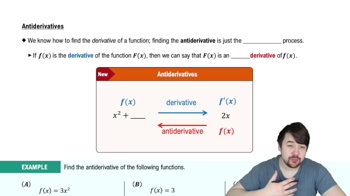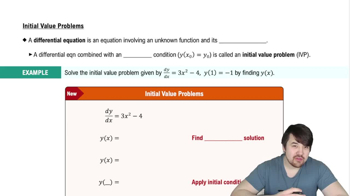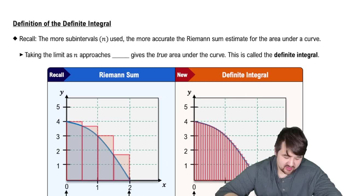"Roots (Zeros) Show that the functions in Exercises 19–26 have exactly one zero
Table of contents
- 0. Functions7h 55m
- Introduction to Functions18m
- Piecewise Functions10m
- Properties of Functions9m
- Common Functions1h 8m
- Transformations5m
- Combining Functions27m
- Exponent rules32m
- Exponential Functions28m
- Logarithmic Functions24m
- Properties of Logarithms36m
- Exponential & Logarithmic Equations35m
- Introduction to Trigonometric Functions38m
- Graphs of Trigonometric Functions44m
- Trigonometric Identities47m
- Inverse Trigonometric Functions48m
- 1. Limits and Continuity2h 2m
- 2. Intro to Derivatives1h 33m
- 3. Techniques of Differentiation3h 18m
- 4. Applications of Derivatives2h 38m
- 5. Graphical Applications of Derivatives6h 2m
- 6. Derivatives of Inverse, Exponential, & Logarithmic Functions2h 37m
- 7. Antiderivatives & Indefinite Integrals1h 26m
- 8. Definite Integrals4h 44m
- 9. Graphical Applications of Integrals2h 27m
- 10. Physics Applications of Integrals 3h 16m
- 11. Integrals of Inverse, Exponential, & Logarithmic Functions2h 31m
- 12. Techniques of Integration7h 41m
- 13. Intro to Differential Equations2h 55m
- 14. Sequences & Series5h 36m
- 15. Power Series2h 19m
- 16. Parametric Equations & Polar Coordinates7h 58m
4. Applications of Derivatives
Differentials
Problem 29b
Textbook Question
Finding Functions from Derivatives
Suppose that f'(x) = 2x for all x. Find f(2) if
b. f(1) = 0
 Verified step by step guidance
Verified step by step guidance1
To find the function f(x) from its derivative f'(x) = 2x, we need to integrate the derivative. The integral of f'(x) = 2x with respect to x is f(x) = ∫2x dx.
Perform the integration: ∫2x dx = x^2 + C, where C is the constant of integration. This gives us the general form of the function: f(x) = x^2 + C.
We are given the initial condition f(1) = 0. Use this information to find the constant C. Substitute x = 1 into the function: f(1) = 1^2 + C = 0.
Solve for C: 1 + C = 0, which implies C = -1.
Now that we have determined C, the specific function is f(x) = x^2 - 1. To find f(2), substitute x = 2 into this function: f(2) = 2^2 - 1.
 Verified video answer for a similar problem:
Verified video answer for a similar problem:This video solution was recommended by our tutors as helpful for the problem above
Video duration:
3mPlay a video:
0 Comments
Key Concepts
Here are the essential concepts you must grasp in order to answer the question correctly.
Antiderivatives
An antiderivative of a function is another function whose derivative is the original function. In this context, finding the antiderivative of f'(x) = 2x involves determining a function f(x) such that its derivative is 2x. The general form of the antiderivative of 2x is x^2 + C, where C is a constant.
Recommended video:

Antiderivatives
Initial Conditions
Initial conditions are specific values given for a function at a particular point, which help determine the constant of integration when finding an antiderivative. Here, the initial condition f(1) = 0 allows us to solve for the constant C in the antiderivative f(x) = x^2 + C, ensuring the function satisfies this condition.
Recommended video:

Initial Value Problems
Definite Evaluation
Definite evaluation involves using the determined function, including the constant of integration, to find the value of the function at a specific point. After finding the antiderivative and constant, we use f(x) = x^2 - 1 to evaluate f(2), which involves substituting x = 2 into the function to find the specific value of f(2).
Recommended video:

Definition of the Definite Integral

 5:53m
5:53mWatch next
Master Finding Differentials with a bite sized video explanation from Patrick
Start learningRelated Videos
Related Practice
Textbook Question
